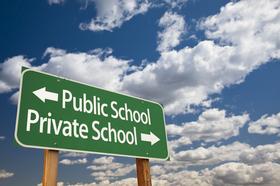Each year, the U.S. Department of Education recognizes hundreds of public and private schools across the country for their commitment to educational excellence and their ability to overcome outstanding odds to properly educate their students. These schools receive the National Blue Ribbon of Distinction, an award reserved for schools that boast students who meet and maintain high educational goals. The Blue Ribbon Award celebrates the idea that all students, regardless of background, ability, or location, deserve an excellent education. The current winners are listed on the .
What is a National Blue Ribbon of Distinction?
The National Blue Ribbon Schools Program honors public and private K-12 schools that are either academically superior in their state or that demonstrate dramatic gains in student achievement. Source: ,
Schools at all levels – elementary, middle, and high schools – are eligible for the award. Each school that is given the honor of a Blue Ribbon Award shares several key characteristics: they have administrators and teachers who are dedicated to high standards of learning for all students, they engage in data collection and analysis to determine the efficacy of instruction and assessment, they have students who demonstrate academic excellence, and they undertake professional development to stay at the forefront of best practices.
The award has been given out since 1982, evaluating student achievement with measurable characteristics that help identify not only the high achievers but also those schools
















